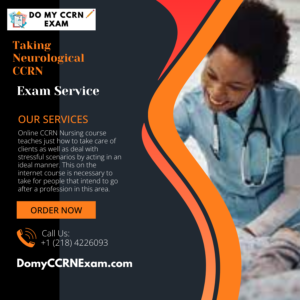Taking Neurological CCRN Exam Service
Registered Nurse Exam (CCRN) takes both hard work and planning. Successful test takers Exam Service devote several months to preparation.
Study Materials
The Certified Clinical Registered Nurse exam spans three hours and comprises 150 questions; of these questions 80% pertain to clinical judgment for adult, pediatric and neonatal patient age groups while 20% focus on professional caring and ethical practice.
Nurses preparing to take the CCRN exam can access many resources available to them for preparation, such as review courses and study guides. But not all students learn in the same ways; some prefer following a study guide or course, while others find greater benefit using flashcards or another learning format.
No matter what approach you take to studying for the exam, it is vital that you know exactly what will be tested on it. AACN provides a CCRN exam handbook which details which body systems and nursing considerations will be tested; this allows you to plan out your studies more effectively as well as identify priority topics to focus on first.
Mock Exams
Practice questions for the CCRN Exam can be an effective way of both recalling and testing your knowledge, while simultaneously giving insight into where you need more work – for instance if Respiratory is your weak spot then dedicating more study time there may be beneficial.
Setting up a study schedule that includes CCRN flashcards can also be extremely helpful; by creating this routine, you’ll avoid cramming and retain information for longer.
Additionally, it is essential that you familiarize yourself with the rules of the CCRN testing center rules. No personal items, including purses, briefcases, headwear and reference materials, may be brought into the testing room during exams. Furthermore, it is imperative that you arrive at your scheduled examination time or you will not be allowed to take the exam; upon arrival you must sign a confidentiality agreement and put any belongings aside from the exam table in a designated area.
Test-Taking Assistance
At an exam, many questions are designed to assess nursing judgment. Answering correctly may require drawing upon knowledge, skill and clinical judgment – in addition, many questions require you to provide specific symptoms or patient data.
Students preparing to take the CCRN exam should develop a study plan and Practice Regularly, while making sure to get adequate sleep and nutrition prior to test day in order to improve mental performance on test day. This will help increase chances of passing.
Acquiring the Certified Critical Care Registered Nurse (CCRN) certification enables nurses to provide acute and critical care services to patients in acute or critical care settings, advance their careers and qualify for special incentives at hospitals that recognize them. The certification is awarded to registered nurses who have provided 1,750 hours of direct care services within two years to acute or critically ill patients – at least 875 of these must have taken place within critical care environments.
Results
CCRN exams are essential steps for nurses who wish to work in critical care environments, requiring extensive study and practice before sitting for them. Though expensive, many employers offer reimbursement or cover the fees.
Exam preparation requires studying an array of topics. A number of strategies exist that can ensure a high pass rate; among the best include identifying high-yield topics and dedicating additional study time towards these areas; for instance, cardiovascular topics account for a substantial part of the exam, so dedicating extra study hours may be worthwhile.
Grouping questions is another useful approach, such as when answering shock state-related questions which require knowledge from multiple perspectives of shock states. Doing this helps streamline studying efforts and maximize efficiency. CCRN Certification is widely respected and provides valuable benefits to patients, nurses, institutions and institutions alike.





